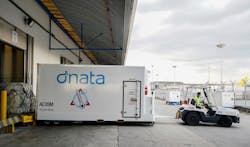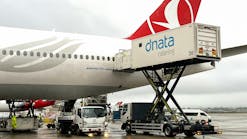The Cargo Handler’s Role in Vaccine Distribution
Even before COVID-19 vaccines were available, the air cargo handling industry was making preparation to distribute them.
Due to the high stakes involved in the distribution of the COVID-19 vaccines and the importance of this valuable and life-saving cargo, proper preparation for handlers is vital, as is the role cargo personnel will play in the safe distribution of the vaccines.
Preparing for Handling
According to officials at UAS International Trip Support, the critical point in cargo handling of COVID-19 vaccines is not the transportation by airplane, per se, but the landside handling.
“While the cargo is flying, the required temperature can be controlled by the aircraft, but once the aircraft lands, i.e., custody is passed from the aircraft operator to the receiving party, it is vital that the ground handling conditions are perfect in order to preserve the delicate, temperature-sensitive cargo,” say UAS officials.
The vaccine needs to pass through customs and security at airports and the cargo loading and unloading is time consuming.
“Considering that the temperature must not be interrupted, the handlers need special equipment. Also, during the time between the cargo hold door opening until the truck loading takes place, the vaccine will be exposed to outside temperatures but must always be kept between 2 and 8 degrees or -7 and -80 degrees, depending on the manufacturer,” say officials UAS. “By this stage, several parties are involved, such as the cargo handling agent, airside ground transportation, customs agents, warehouse personnel and landside truck loading. All these links in the chain play a crucial part in the safe and secure handling of COVID-19 vaccines.”
According to Dirk Goovaerts, regional CEO for Asia Pacific at dnata, it has become increasingly crucial for both airlines and freight forwarders to be supported by reliable and certified handlers that can protect their pharma shipments and ensure the products remain in perfect condition until they reach the end customer.
“We have significantly invested in equipment, facilities and training to ensure the uncompromised integrity of pharmaceuticals in the air cargo supply chain. dnata is one of the leading cargo handlers in Australia and Singapore that invested in processes and equipment to obtain certification from the industry’s top associations,” he says. “dnata Singapore holds the IATA Center of Excellence for Independent Validators (CEIV) Pharma accreditation. This is in addition to the ISO 9001:2015 certification for cargo handling services and the Halal certification for a special holding room in our cool chain facility. dnata Australia is proud to be the only cargo handler in the country with the World Health Organization’s (WHO) Good Distribution Practices (GDP) certification.”
As an airline, EVA Air Cargo operates “EVA Pharmacare” cold chain service throughout Asia, Europe, and North America.
“We offer effective solutions for safely and reliably transporting products that demand precise temperature-controls such as vaccines, biotechnology-based medicines, perishable foods and more,” EVA Air Cargo officials say. “To meet transportation demand for the different COVID-19 vaccines, we work with specialized service providers. We were careful in our selection of these service providers to ensure that they are skilled and equipped to support our customers’ temperature-controlled handling needs.”
As the first and largest IATA CEIV Pharma certified community in the Asia Pacific, with at least one member in each node of the air cargo supply chain, the air cargo hub at Singapore’s Changi Airport offers an uninterrupted cold chain for the handling of temperature-sensitive pharmaceutical shipments, according to the Changi Airport Group.
“Recognizing that the distribution of COVID-19 vaccines is a challenging task, the Changi Ready Taskforce has been set up to better prepare our air cargo community to meet the logistical demands of vaccines distribution. This includes assessing and ramping the hub’s ability to handle different types of COVID-19 vaccines, all within a stringent temperature-controlled environment to maintain the vaccines’ efficacy, as well as to manage an expected surge in the volume of vaccines to be air transported to the region,” officials at Changi Airport Group say.
dnata’s operational processes for exporting and importing air cargo, including transitional warehousing, biosecurity, customs clearance and distribution of pharmaceuticals, medical devices, and related materials to the healthcare industry, already follow strict compliance and controlled guidelines, notes Goovaerts.
“We have recently further enhanced our pharma handling capabilities by investing in cool dollies in Singapore and Australia. These new, high-tech containers are specially designed to serve the pharmaceutical industry with a closed temperature-controlled system for seamless delivery of temperature-sensitive goods between cargo warehouses and aircraft,” he says. “We are the first cargo handler to operate cool dollies at Singapore Changi Airport and will soon launch this state-of-the-art equipment in Sydney and Melbourne, too, offering customers excellent value services throughout the handling process.”
Procedures and Guidance
UAS officials observe that cargo handlers should follow the manufacturers’ guidance when handling vaccines, in addition to other suggestions provided by local authorities in charge of the immunizations as they can advise on specific governmental guidance, restrictions and requirements.
“Based on this information, standard operating procedures (SOPs) must be created to cover all aspects of vaccine management and include routine and emergency response procedures for equipment malfunction, weather issues and power outages. The SOPs should be reviewed at least annually and whenever a new vaccine is introduced,” say UAS officials. “Prior to aircraft arrival, allocated members of staff should liaise with the receiving party for specific coordination and handling guidance. This is particularly important for a vaccine that has not been handled before. Every vaccine requires different temperature configurations, and this entails the use of containers specially constructed for this purpose.
“Once on the ground, every effort must be made to ensure this temperature is maintained until the vaccine is delivered into the hands of medical professionals at its destination, so cold storage will require adequate temperature-monitoring equipment be calibrated and available,” they continue. “The CDC recommends using a continuous monitoring digital data logger (DDL) for each unit and have a backup DDL unit as well.”
Well thought-out procedures for inventory management must also be in place. Effective and clear communication will also play a large role.
“The handling staff will need to pre-coordinate the turnover of the vaccines with the receiving party and ensure the proper authorities have advised and the customs clearance process has been identified and prepared for in advance of the aircraft's arrival. It is vital that potential logistical bottlenecks are identified early in the process,” UAS officials explain.
Goovaerts observes that it is particularly important to ensure that the vaccine is handled and stored in a temperature-controlled environment throughout the handling process.
“Our state-of-the-art equipment and facilities enable us to offer uncompromised temperature-controlled handling and storage solution to airline customers in Singapore,” he says. “Providing temperature-controlled storage from -25°C up to +25°C, the cool dollies mitigate the risk of temperature deviations and contamination. They have a closed structure with alarms on opening and closing, as well as alerts if temperatures fluctuate above acceptable ranges. As they are fitted with solar panels, the cool dollies are both environmentally friendly and autonomous. The units are also hygienic and easy to clean, which is a crucial consideration for pharma cargo.”
dnata’s cargo handling facilities in Singapore, Melbourne and Sydney have temperature-controlled and monitored cold storage rooms for the handling of all medical air cargo, including vaccines.
“We work closely with the air cargo supply chain from shippers to consignees, government agencies and regulatory authorities as well as airlines and airports,” says Goovaerts. “Our pharma and perishable handling center at Changi Airport was designed and built with flexibility and unique product handling requirements in mind, taking advantage of the latest cold storage technologies and designs. The temperature-controlled areas in the facility are modular, enabling teams to manage changing handling demands with dedicated climate control capability. A web-based monitoring system is also in place to facilitate real-time management of all areas.”
Training and Qualification
There is indeed a high level of skill and expertise required for handling medical supplies, therefore cargo handling companies need to constantly update and refresh their skills.
“As for this large scale, global vaccine movement – it is the first of its kind so the global exportation will really set a precedent for the future. All staff members involved in the transportation, storage or handling of vaccines must be trained on the safe handling of the vaccination,” say officials at UAS. “This training should be conducted upon orientation, every time new vaccines are added, as recommendations are updated and annually. The training should also be documented and include the type, date and names of participants.”
dnata has invested in equipment, facilities and training to ensure the uncompromised integrity of pharmaceuticals in its air cargo supply chain.
“We have a dedicated team at Singapore Changi Airport based at our pharma and perishable handling center. These staff have all been certified under the IATA CEIV pharma program,” says Goovaerts. “The CEIV Pharma certification ensures that all facilities, equipment, operations and staff in the certified organizations comply with the highest standards, in line with the World Health Organization’s pharmaceutical handling guidelines.”
The pharma handling teams of dnata have also completed advanced training in quality systems, temperature control and active container handling.
“The staff training on handling exceptions and emergency response has been a major focus for us. For example, constant human intervention and monitoring are important for our dedicated pharma handling team to respond swiftly if required to regulate the container's temperature by removing or adding dry ice if the temperature is incorrect,” says Goovaerts.
Business Outlook
It is well known that for the aircraft ground handling business 2020 was an annus horribilis as passenger flights were severely impacted by approximately two-thirds of the world’s fleet being grounded as the pandemic started.
Still air cargo supplies had to keep going.
“Our ground handling business has been busy throughout this period with the increase of passenger freighters. This demand was mainly due to the distribution of shipments like personal protective equipment (PPE) and increased e-commerce volumes resulting from lockdowns and people staying home to avoid crowds,” says Goovaerts. “We re-deployed staff from other business units and generally pivoted much of our business investments and developments towards cargo. Although we do not expect the vaccine to give a significant boost on its own, it might displace other cargo, which could create supply chain inventory stock challenges.”





